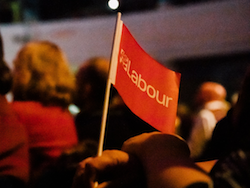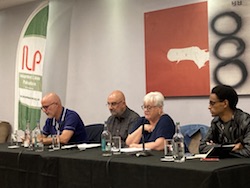The idea of Labour as a broad based political church has been around as long as the party. But it’s come under attack in recent years like never before. NEIL RHODES considers how we can fight back.
There is a quote that reappears every now and then: “The Labour Party owes more to Methodism than to Marxism.”
 It was first uttered by Labour general secretary Morgan Phillips in a 1953 speech written by Denis Healey, the future chancellor and stalwart of the Labour right. It contains an implicit recognition of Labour’s longstanding tradition of plurality and diversity, the connection and continuum of thoughts and ideas that have shaped its development over the decades since it was founded in 1906.
It was first uttered by Labour general secretary Morgan Phillips in a 1953 speech written by Denis Healey, the future chancellor and stalwart of the Labour right. It contains an implicit recognition of Labour’s longstanding tradition of plurality and diversity, the connection and continuum of thoughts and ideas that have shaped its development over the decades since it was founded in 1906.
Whether Methodism or Marxism have had the greater influence is open to question. What should not be is Labour members’ freedom to express ideas based on either or both strains of thought, as well as many others besides.
That idea – of Labour as a broad church encompassing many shades of progressive political thought – has recently come under attack like never before in the party’s history. Yet, it is an idea rooted in and fundamental to that history.
When the ILP was born 130 years ago, its founding conference on 13 January 1893 featured delegates from local independent labour parties, the Fabian Society, the Social Democratic Federation, the Scottish Labour Party and a number of other organisations and individuals. They held many different ideas and perspectives but came together to create a political agency to represent labour and make the break from Liberalism. Despite the differences, through discussion and debate they managed to find a common purpose, seeking words and a format they could all sign up to.
The ILP went on to help found the Labour Party, taking the broad church with it as it brought the trade unions and others under the Labour banner. Over the years since, there have been many groups and influences inside the party.
On the left alone we’ve had the Tribune Group, the Socialist Campaign Group, the Campaign for Labour Party Democracy, the Labour Co-ordinating Committee, and the ILP, as well as numerous others. Many have come and gone; others are still around in some form. They have all been committed to their own ideas for change and their members have been able to argue for those within the party.
The ILP itself left Labour in 1932 when Ramsey MacDonald, a former ILPer, joined the National Government. When it rejoined in 1975 it did so with a clear understanding that the route to progressive change lay through a radical campaigning Labour Party, one that was broad based politically but tolerant and open to democratic discussion and influence from the membership.
It has spent much of the near half-century since campaigning for that kind of party, arguing that Labour must be shaped from the borrom up, and should have a politically neutral constitution and framework that favours neither one tendency nor another, so that ideas can be discussed openly and decisions made democratically. This is why we advocated one member, one vote in the 1980s, for example.
But it’s not just the ILP that believes in these ideas. Indeed, the recent Forde Report into the internal workings of the party put it this way: “The party’s leaders have consistently recognised that the party is a broad church or it is nothing. Consecutive leaders have used the image of a broad church, often as a way of bringing together left and right.
“In the 21st century, however, in my view, a broad church also requires the party to embrace, celebrate, encourage and enrich the lives of those with protected characteristics, and to do so with equal determination and commitment no matter what the nature of the protected characteristic in question.”
Factionalism
In the past few years, however, the broad church has been damaged as the party leadership has moved to control parliamentary selections and policy-making processes. Some elected representatives have been barred from standing again, some members have been expelled on spurious grounds, or threatened with expulsion, and there is a toxic atmosphere in some parts of the Labour Party that is stifling discussion and debate.
 Some members are afraid to voice their opinions, and many have left or stopped attending meetings or joining campaigns. Like most members, I joined Labour to try to make the world a better place. No-one joins to be abused for what they say, nor to be belittled or made to feel they don’t belong. But that has been some members’ experience over the last few years.
Some members are afraid to voice their opinions, and many have left or stopped attending meetings or joining campaigns. Like most members, I joined Labour to try to make the world a better place. No-one joins to be abused for what they say, nor to be belittled or made to feel they don’t belong. But that has been some members’ experience over the last few years.
The Forde Report describes all this in no uncertain terms, agreeing with the earlier Kerslake Review into Labour’s organisational structure, which stated: “It is in the nature of a broad political party to have competing views and perspectives and this has always been the case for the party. What is different here is the way in which factionalism has become embedded in the way the party itself operates, creating distrust and division.”
Damningly, Forde goes on to say: “We found little evidence of mutual respect and a great deal of evidence of factionalism, so deep rooted that the party has found itself dysfunctional. It has been spending more time occupied by factional differences, than working collaboratively to demonstrate that the party is an effective opposition…
“Whilst we recognise and applaud many aspects of the party’s recent reforms of disciplinary procedures, we do have concerns that there appear to be no published procedures governing the use of administrative suspensions and that these appear to be operating without clear criteria for their use being widely available. We are also concerned that the provisions which allow for individuals to have membership removed or denied on the grounds they have committed prohibited acts could be exploited for factional purposes.”
One of the report’s recommendations is that the party should provide training for members to develop deep listening and reflection skills so they can engage fully with those who have different views. Many of the recommendations have been accepted by the party leadership and some should have been put into action, according to Labour’s website, including the work on listening and training in CLPs.
Perhaps these recommendations could give us a lever to fight back against the party’s undemocratic culture. Is your constituency party implementing the recommendations? Does it know about them? Why don’t we find out?
If Labour’s broad church is to have a future, members will have to listen to each other and allow for differences. And the party will have to give them space to discuss ideas in a tolerant atmosphere.
No-one has all the answers about how to change our society for the better, but if we work in co-operative ways and listen, value and respect each other we will at least have a chance. There will be disagreements, of course, but all of us in the Labour Party need to respect each others’ right to be part of the process.
—-
Neil Rhodes is a former general secretary of the ILP, a Labour Party organiser and more recently a steward and convenor in UNISON.
This is a revised an edited version of Neil’s speech at the ILP’s Labour conference fringe meeting on 10 October entitled ‘Does Labour’s broad church have a future?’.
The photo above shows (left to right) Neal Lawson of Compass, Neil Rhodes, Mary Stratford (chair) and Amen Tesfay of Open Labour.



29 October 2023
Thank you, Neil. Very useful and well worth consideration by everyone in the Labour Party.
18 October 2023
The problem isn’t the rank and file Labour members, who are (on the whole) no more or less tolerant and diverse than they have ever been. The problem is the leadership, which has:
1) completely capitulated to the market and its associated worldview, to the point of Conservatism
2) pursued short-term electoral success to the exclusion of all other factors, including democracy and Labour values/principles (claiming to be ‘non-ideological’ and ‘pragmatic’).
Democratic socialists in Labour’s historic tradition have been told, “The door is open. You can leave.” But Conservatives are “welcome”. Jeremy Corbyn (who could have behaved better himself, but that is not the point) has been treated appallingly, far in excess of any transgression on his part. Any Labour democrat must support the right of CLPs to select their own candidates, other than in exceptional circumstances (which Corbyn’s is not).
The operation has met with some success, but the patient has life-threatening injuries. The ILP must appeal to Labour democrats and “broad church” supporters from all tendencies in the party, to preserve it.